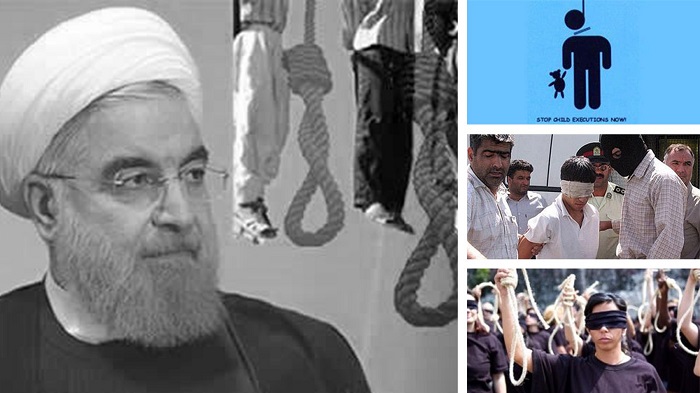
The dire human rights situation in Iran during the Rouhani course.
Mujahedin-e Khalq (PMOI/ MEK Iran) reports from Iran indicate that two prisoners in Adilabad Prison in Shiraz were hanged on Wednesday 12th February. They have been named as Sadeq Akbarpour and Hadi Mahi and were arrested in 2016 on charges of rape and murder.
This adds to the many thousands of people that have already been executed in Iran since the so-called “moderate” President Hassan Rouhani took office.
Capital punishment is used as a tool of repression and suppression and there have been many concerns raised by the international community and by human rights activists and organizations.
Dozens of juveniles and more than a hundred women have been executed since Rouhani became president in 2013. It is estimated that around 4,000 executions have taken place since then, however, it is very difficult to pinpoint a figure considering the regime’s lack of transparency regarding its practices.
The people of Iran are becoming increasingly dissatisfied with their situation and they are becoming more and more bold in their attempts to speak out against the regime, despite the huge personal risks that they are opening themselves up to. To protest in the street and to speak out against the despotic rule that they are subjected to, the people of Iran risk imprisonment or even execution.
The whole judicial system is corrupt and unfair. Ebrahim Raisi, one of the most brutal officials in the country, is the head of Iran’s judiciary. The former presidential candidate was heavily involved in the 1988 massacre.
He was a Deputy Prosecutor General at the time of the 1988 massacre and he became a member of a so-called “Death Committee” that basically gave the go-ahead for the execution of political prisoners. The 1988 massacre was one of the most gruesome and horrifying abuses of human rights in recent history. Men, women, and juveniles were executed simply because they were affiliated in some way or another, or expressed sympathy for, the main opposition to the Iranian regime – the PMOI / MEK Iran.
A Daily Express article recently described the angry protests that took place last month in Tehran and other cities around #Iran #IranProtests #MEK #HumanRights @USAdarFarsi pic.twitter.com/QIl7bwejVL
— MEK Iran (Mujahedin-e Khalq) (@MEK_Iran) February 11, 2020
The appointment of a judiciary chief with such a horrifying history shows that the Supreme Leader wants to maintain a rule of terror. It is a way for the regime to contain social unrest. But it is a tactic that is failing spectacularly because there have been a number of significant uprisings in recent months.
International human rights organizations are continuing to campaign for the abolition of capital punishment in Iran. Iran is the country that executes the most people per capita in the world and it tops the list with regards to the execution of offenders that were juveniles at the time of committing a crime.
Forced veiling has been one of the Iranian regime’s most basic means to suppress women in #Iran.
Here is Rouhani boasting about being the one to ban the entry of unveiled women as a basis to oppress Iranian women.https://t.co/2YEljS0oVN#MyVoteRegimeChange— Women's Committee NCRI (@womenncri) February 15, 2020
Amnesty International expressed its grave concern regarding the crackdown against protesters at the end of last year, describing the regime’s actions as “vicious”. The organization’s Middle East and North Africa Research Director Philip Luther said that the “widescale clampdown” was “designed to instill fear and prevent anyone from speaking out about what happened”. He also urged the international community to take “urgent action”.
